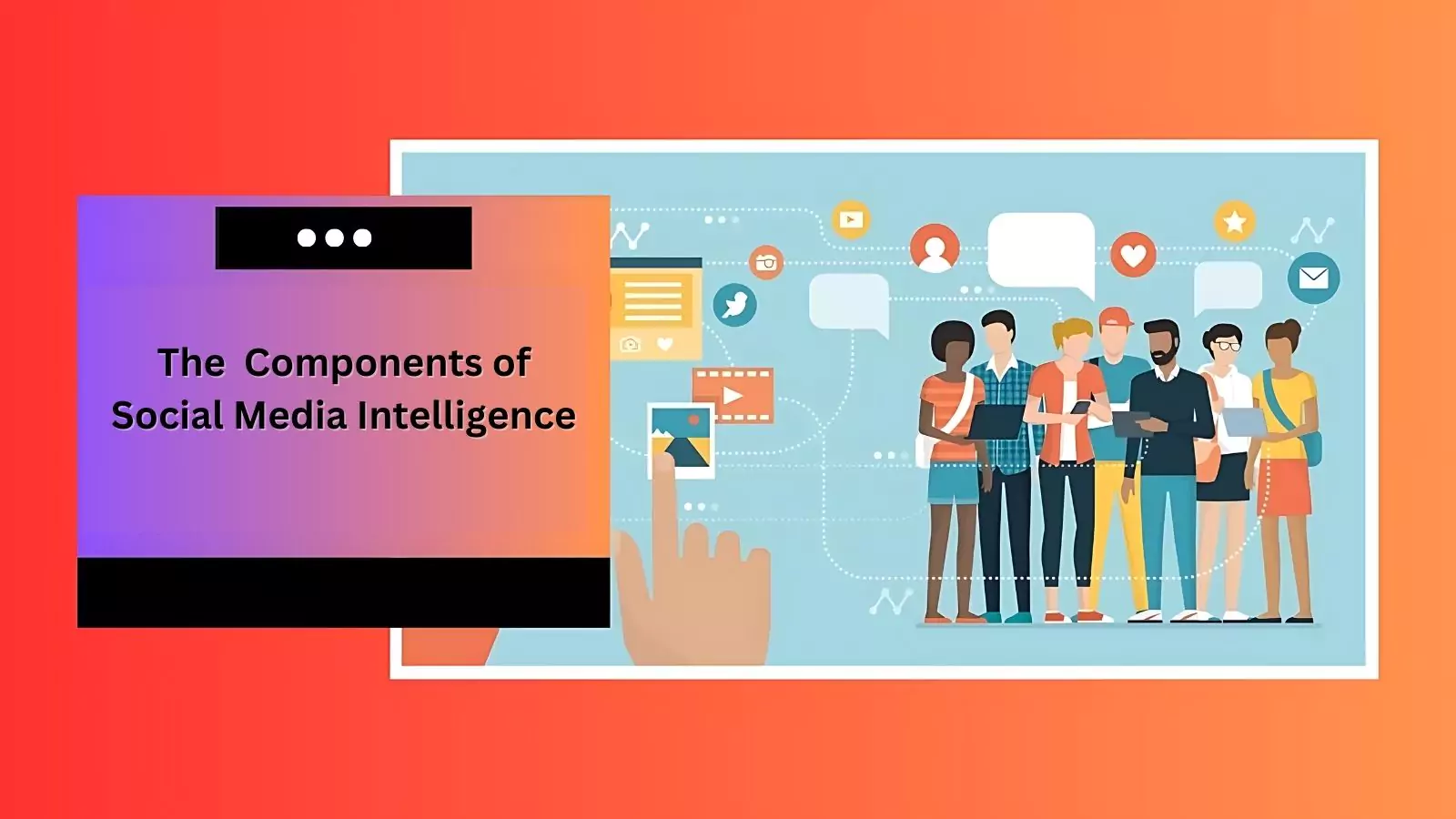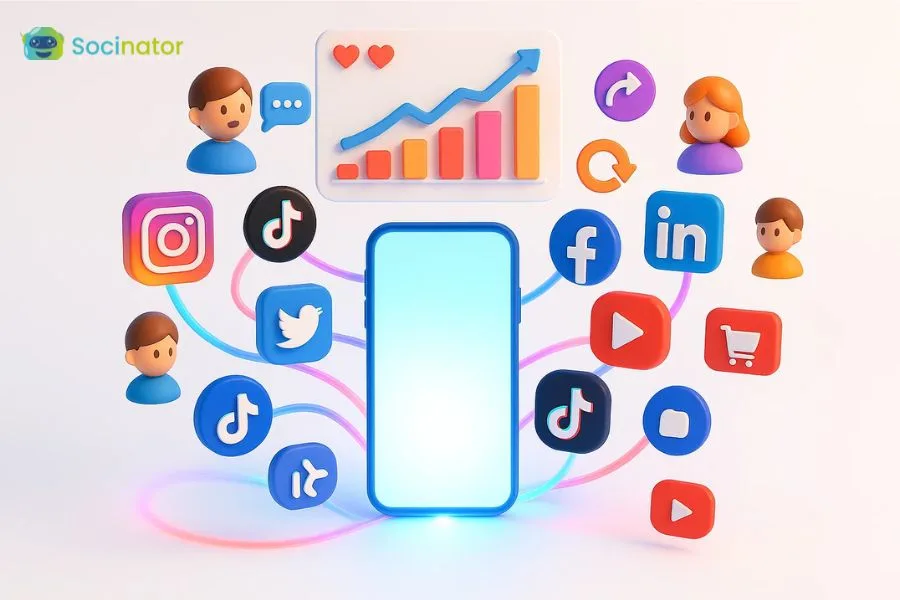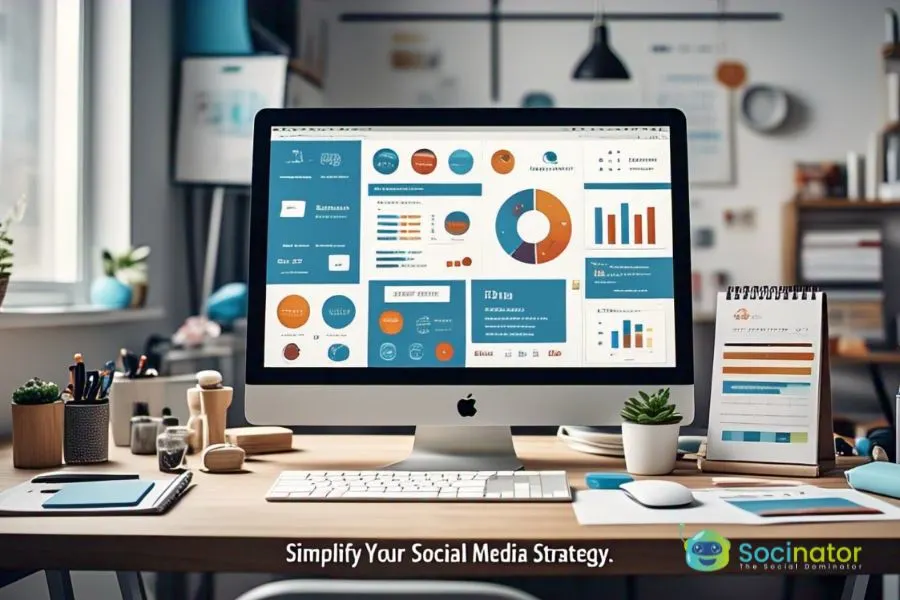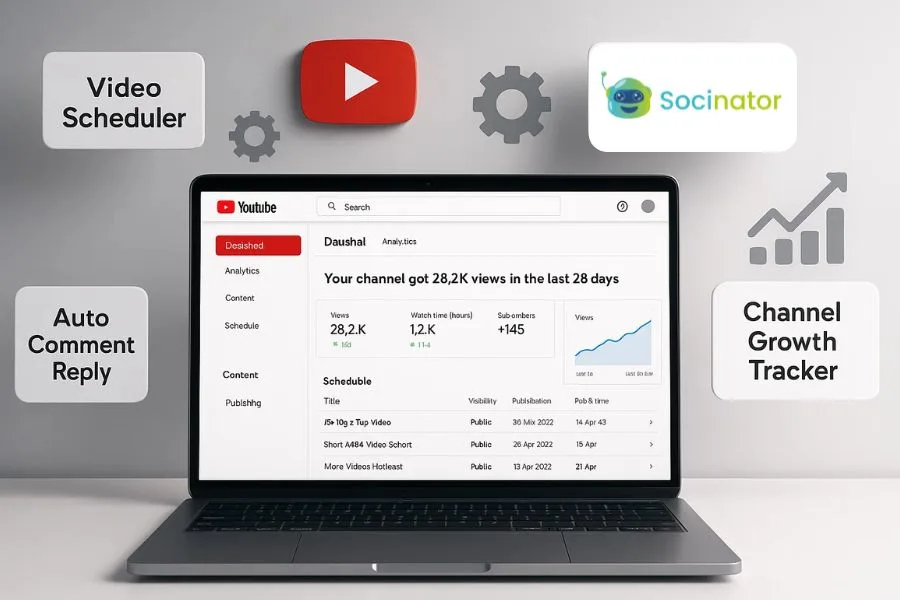Did you know millions of social media posts are created every minute, packed with useful information about your target audience? Social media intelligence helps you sort through all this data to find insights that can completely change your marketing approach, improve your products, and handle any crisis better.
Social media intelligence isn’t just about counting likes and comments; it’s a full toolkit of social media marketing tools, like analytics, that help you understand how to improve your strategy and grow your brand.
Ready to turn your social media from noise into a powerful marketing tool?
Let’s explore social media intelligence and uncover some interesting facts.
Hit ‘Play’ Button & Tune Into The Blog!
What Is Social Media Intelligence?
Social media intelligence entails collecting and examining data from social media platforms to understand customer behavior, market trends, brand perception, and competitor activities.
This process involves monitoring conversations, tracking metrics like engagement and sentiment, and also leveraging social business intelligence tools to extract actionable insights for strategic decisions. Social intelligence enables businesses to better understand their audience, identify opportunities more effectively, manage risks, and enhance marketing strategies.
Social Media Monitoring vs. Social Listening vs. Social Media Intelligence
Brands must understand the differences between these three related concepts to gather insights effectively and make informed business decisions. Social Media Monitoring was the initial step, followed by the development of Social Listening, which eventually evolved into what we now recognize as Social Media Intelligence.
Social Media Monitoring:
Marketing teams track the brand’s social media activity and customer interactions to identify potential risks associated with specific products or services and understand the brand’s online image. However, the insights from monitoring are often subjective and not based on thorough data analysis. As a result, the business decisions influenced by these insights can be reactive and not always optimal. This limitation highlights the need for more detailed data collection, leading to Social Listening.
Socinator, a powerful social media automation tool, helps by not only streamlining the monitoring process but also providing deeper insights, enabling teams to make informed, data-driven decisions.
Social Listening:
Social Listening tools enable brands to gather data from various social media engagements and interactions worldwide. These allow brands to analyze owned Media, which includes all posts made by the brand and earned Media, which encompasses unprompted posts by consumers about the brand.
However, Social Listening alone is insufficient as it doesn’t provide a comprehensive view of the brand’s performance due to the lack of in-depth social media data analysis. It is where Social Media Intelligence comes into play, helping to strengthen your social media presence and overall business and marketing strategies.
Social Media Intelligence:
Going beyond superficial metrics such as ‘likes’ and social media mentions, Social Intelligence emphasizes tracking and analyzing more meaningful insights that drive your business growth.
With the help of social media automation tools like Socinator, you can efficiently monitor a wide range of social media activities, track key performance indicators (KPIs), and collect detailed analytics. By automating these processes, Socinator helps you identify trends, understand audience behavior, and evaluate content performance. This data-driven approach ensures that your social media strategy is both effective and insightful. Leveraging these insights allows you to compile a comprehensive social media intelligence report, enhancing your strategic decision-making.
In essence, utilizing data from social listening and analytics tools to gain insights is known as Social Media Intelligence. This approach can help your brand better understand customers, predict their behavior, and anticipate emerging trends, allowing you to stay ahead of the competition. By letting data drive your decisions, you can not only enhance customer interactions online but also improve decision-making, elevate customer experience, and strengthen brand equity.
Additionally, leveraging the Socinator tool can further streamline your efforts by automating social media activities, tracking performance, and providing actionable insights, helping you optimize your strategy and stay ahead in the market.
Socinator: Social Media Automation Tool
 Socinator is a versatile social media automation platform that helps businesses and individuals manage their- social media accounts efficiently. It enhances social media intelligence by providing a comprehensive suite of features designed to monitor, analyze, and optimize social media activities.
Socinator is a versatile social media automation platform that helps businesses and individuals manage their- social media accounts efficiently. It enhances social media intelligence by providing a comprehensive suite of features designed to monitor, analyze, and optimize social media activities.
Here are the key features of Socinator:
- Automated Scheduling: Socinator allows you to schedule posts and stories across various social media platforms in advance. This feature helps you maintain a consistent posting schedule without needing to be online all the time.
- Performance Tracking: With Socinator, you can track the success of your posts and campaigns in real time. By monitoring metrics like likes, shares, comments, and reach, you can gauge the effectiveness of your social media efforts and make data-driven adjustments.
- Engagement Management: Socinator facilitates engagement by automating responses and interactions with followers, ensuring you stay connected with your audience even when you’re not actively managing your accounts.
In a world where social media is a key driver of engagement and growth, Socinator provides the intelligence needed to stay ahead. By leveraging its features- you can make smarter decisions and achieve greater success. Embrace Socinator for a deeper understanding of your social media landscape and unlock the potential of social media intelligence.
The Main Components Of Social Media Intelligence
 Social intelligence includes four essential components: monitoring, collecting, analyzing, and taking action. Here’s a brief overview:
Social intelligence includes four essential components: monitoring, collecting, analyzing, and taking action. Here’s a brief overview:
1. Monitoring
The first step in social media intelligence is to monitor various social networking sites where your target audience is active. It allows you to observe how people are responding to your products or services in different contexts and track the types of conversations taking place.
These enable you to track what people are saying about your brand, competitors, and products, as well as any relevant keywords over a specified period.
2. Collecting Data
Once you’ve pinpointed relevant social media conversations, the next step is to gather data for your analysis. This data can include demographic information (such as age and gender), user behavior, sentiment analysis, trends, and more.
The purpose of collecting data is to gain a thorough understanding of your target audience, enabling you to tailor your marketing campaigns effectively.
3. Data Analysis
With a wealth of data at your disposal, the next step is to analyze it. Data analysis- whether performed manually or through automated tools- helps uncover insights into customer behavior and conversion trends. By integrating a social media management tool like Socinator into your analysis process, you can automate social media data gathering and track performance metrics across various platforms efficiently. Socinator helps you identify patterns, understand audience engagement, and optimize your social media strategy, making the analysis more streamlined and actionable.
4. Taking Action
Once you have a comprehensive understanding- of your target audience, it’s time to turn that data into actionable steps. It could include A/B testing, optimizing landing pages, creating targeted campaigns, or adjusting your product offerings.
The goal is to use the insights gained from data analysis to make informed decisions that enhance the customer experience and boost ROI.
What Is Social Media Intelligence Used For?
 You might be wondering, “Okay, I understand what social intelligence is, but how is it applied in the real world?”
You might be wondering, “Okay, I understand what social intelligence is, but how is it applied in the real world?”
Great question!
Social intelligence is more than just a buzzword; it has practical applications that go beyond business, extending into safety and governance. Let’s explore the various ways this tool is used and why it matters.
1. Business Applications
- Market Research: Companies analyze social media trends to understand consumer preferences and identify emerging markets.
- Customer Service: Brands utilize social media to swiftly address customer complaints, improving their reputation.
- Competitive Analysis: Businesses monitor competitors’ social media activities to gain insights into their strategies.
2. Security And Law Enforcement
- Threat Assessment: Security agencies scan social media to identify potential security threats or extremist activities.
- Criminal Investigations: Law enforcement agencies use social media to gather evidence and track criminal behavior.
- Public Safety: Social media is used for real-time monitoring during events, aiding in crowd control and emergency response.
3. Public Policy And Governance
- Public Sentiment: Governments analyze social media to assess public opinion on new policies or political campaigns.
- Disaster Response: Social media data helps in real-time assessment during natural disasters, facilitating effective relief operations.
- Health Monitoring: Trends on social media can provide early warnings about disease outbreaks or public health crises.
4. Ethical and Legal Considerations
- Privacy Concerns: Balancing data collection with respect for individual privacy is an ongoing ethical dilemma.
- Data Accuracy: Ensuring that the social media data collected is reliable and accurate is a significant challenge.
- Legal Constraints: The collection and use of social media data are governed by laws and regulations that must be adhered to.
5. Challenges and Limitations
- Data Overload: The vast amount of social media data can be overwhelming, requiring advanced tools for effective analysis.
- Ethical Dilemmas: There is a responsibility to use social media data in an ethical and unbiased manner.
- Platform Limitations: Each social media platform has its restrictions on what data can be accessed and how it can be used.
What Can Social Media Intelligence Do For Your Brand?
Integrating social media intelligence into various aspects of your business can yield significant benefits:
- HR: Social intelligence can help HR understand public attitudes toward the brand, which may influence hiring policies and improve employer branding.
- R&D: Insights from social media can guide research and development by identifying the features that customers desire in future products or services.
- Customer Service: Social media data can reveal peak times for support requests and highlight the types of assistance customers need most, enabling more effective resource allocation.
- Marketing: Marketing teams can assess the impact of their messaging on their audience and compare it with competitors, helping to refine strategies and improve campaign effectiveness.
- Sales: Social media intelligence can uncover common issues faced by potential buyers, allowing sales teams to address these problems directly and tailor their pitches accordingly.
For brands, the key is to ensure that insights from social media monitoring and analytics tools are shared- across all departments. This collaborative approach enables a more cohesive strategy and maximizes the benefits of social intelligence.
Read More,
How Can You Leverage Social Business Intelligence For Your Business
Social Media Listening: 5 Essential Tips For Business Growth
Social Media Intelligence Across Different Platforms
To harness social media intelligence, the journey begins with data collection. This data is pulled from social networking sites through an Application Protocol Interface (API). Although this raw data alone doesn’t equate to social media intelligence, it holds potential when processed correctly.
Metrics derived from analyzing and combining this data can provide valuable insights. For instance, benchmarking industry brands together can yield meaningful intelligence. Social media analytics tools enhance this process by employing social media intelligence analyst data to manually tag content on platforms like Facebook and Twitter. This tagging helps identify campaigns and content categories, which, when overlaid with engagement metrics, reveal which campaigns are effective and what type of content resonates best with audiences.
Tools like Socinator simplify this process, automating posts and providing in-depth analytics to help brands make data-driven decisions more efficiently.
Given the massive volume of social media data, algorithms are essential for sorting and grouping data to reveal trends and outliers that might be overlooked by human analysis alone.
Facebook Social Intelligence
Each social network provides distinct metrics reflecting social media success, with each network playing a unique role in your marketing strategy. Facebook, for example, is a key platform for building and maintaining brand loyalty while extending your brand’s reach. With its 2.2 billion monthly active users, Facebook is often the starting point for many brands’ social media strategies.
On Facebook, engagement metrics such as likes, shares, and impressions are crucial. Monitoring these can help ensure that your content engages your audience effectively, enhancing brand recall and loyalty. Facebook’s analytics platform offers extensive insights into customer behavior, including demographic information and the customer journey across multiple platforms, making it a powerful tool for boosting ROI.
Twitter Social Intelligence
Twitter has become a hub for immediate customer feedback and content amplification. Many brands now have dedicated Twitter handles for customer service, managed by CRM teams rather than marketing teams. This setup allows for better response times and improved customer satisfaction.
Analyzing Twitter data provides real-time insights into audience engagement and broader conversations about your brand. Metrics like the number of retweets and mentions combined with understanding the context behind these interactions- offer actionable insights.
For instance, during a brand crisis, social media listening can alert you to emerging conversations, while analytics help you gauge your brand’s performance against competitors. Metrics like Share of Voice can reveal your brand’s dominance in key industry discussions, guiding necessary strategic adjustments.
Instagram Social Intelligence
As digital marketing shifts towards visual content, Instagram has become a leading platform for brands, boasting over 800 million monthly users. Instagram’s hashtag feature allows users to follow and discover trending topics, making hashtag analysis essential for identifying consumer trends and testing marketing strategies.
Metrics such as posting times are crucial for optimizing engagement. Engagement levels can vary on different days of the week, and recognizing these patterns can help optimize your reach. For instance, posting on days with higher engagement, like Fridays, can enhance your brand’s visibility.
YouTube Social Intelligence
YouTube is a key visual medium. YouTube’s dashboard offers performance metrics for your videos, but insights into competitors’ videos can be less straightforward. YouTube intelligence can detect potential virality before a video becomes widely popular. Analyzing growth rates and comparing them with industry norms can identify exceptional content.
Video duration also provides insights into industry trends. For example, longer videos might perform better in certain sectors, such as the soft drink industry. Additionally, tracking subscriber growth and comparing it with industry benchmarks can reveal areas for improvement and competitive positioning. Robust YouTube intelligence helps enhance channel performance and monitor competitor activities effectively.
Wrapping Up
Social media intelligence is crucial for contemporary business strategies, providing valuable insights into customer behavior, market dynamics, and competitive trends. By leveraging social media threat intelligence, you can analyze data from various platforms to detect potential security threats, risks, and malicious activities.
Utilizing tools like Socinator, businesses can gain invaluable insights into consumer behavior, competitive strategies, and market trends. Socinator’s capabilities allow for efficient tracking, scheduling, and analysis of social media performance, making it easier to turn data into actionable strategies.
Additionally, this intelligence helps bolster your cybersecurity measures, safeguard your reputation, and maintain a secure and trustworthy online presence for your business and personal accounts.






